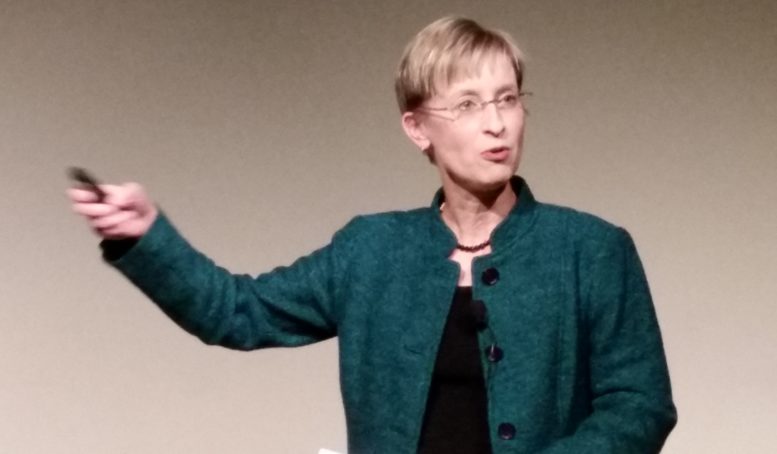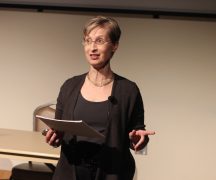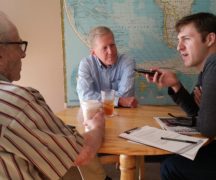By JAN LARSON McLAUGHLIN
BG Independent News
The battle of the sexes has many combat zones – with political knowledge being one of the battlefields.
For decades women have scored lower than their male counterparts on political knowledge surveys. That trend irked Bowling Green State University political science professor Dr. Melissa Miller enough that she decided to study that “pesky gender gap.”
Miller shared her thoughts on the political battle of the sexes recently during at talk at BGSU.
Since 1960, national surveys ranking political knowledge asked basically the same questions:
- Which party controls the U.S. House of Representatives?
- Who is the vice president?
- Which branch rules on the Constitutionality of an issue?
- What majority is required to override a presidential veto?
- Which is the more conservative political party?
“Men on average are more likely to get the answer right,” Miller said. “This is troubling.”
For years, the gender gap was blamed on women spending more time at home, being less likely to discuss the topic at work, and being less interested in politics than men.
However, those trends just no longer hold true, Miller said. Women in the U.S. are currently more educated, spend less time at home on housekeeping, are more likely to share child-rearing chores, and are much more likely to have jobs outside the home.
“So why hasn’t the gender gap disappeared?” she asked.
Miller has some ideas.
“Maybe it’s the way we measure political knowledge,” she said.
Upon looking closer at the way the surveys were conducted, Miller noticed that the political surveys included multiple choice answers – with one of those answers being “I don’t know.” And whether conducted by phone or in person, those taking the surveys were always advised that many people don’t know the correct answer, so they can pick “I don’t know.”
Seems insignificant? Not so, Miller said.
Women are far more likely to take the bait and say “I don’t know.” Men are more likely to risk a wrong answer, and less likely to say they don’t know.
Miller used BGSU mascots Freddie and Frieda Falcon to explain.
“Frieda is more likely to say ‘I don’t know.’ Freddie has a higher propensity to guess,” she said. “A lot of men have a higher propensity to guess. A lot of women have a decreased propensity to guess.”
So Miller suspected the “don’t know” option was inflating men’s scores while deflating women’s scores.
To see if her suspicions were accurate, Miller conducted a campus political knowledge study in 2006, in which she sampled more than 900 undergraduates. Randomly, half of the students got surveys with the “don’t know” response option, while the other half did not have that option.
The “don’t know” surveys showed the same gap between men’s and women’s political knowledge. But when that option didn’t exist, the gender gap was gone, Miller said.
Miller’s suspicions were further confirmed when she placed a fictitious name on the survey and asked the students to identify the political office held by “Neal Nardone” – which happened to be a name created by combining the names of Miller’s husband and the husband of Shannon Orr, another member of the faculty working on the survey.
“The men insisted on trying to guess,” the office held by Neal Nardone. Some felt he was Secretary of Transportation, or Director of FEMA. “Men insisted on guessing.”
Miller also pointed to other possible reasons that men may score higher on political knowledge surveys. Traditionally, the surveys cover just national electoral politics, which have been dominated by men for centuries.
Studies in states with at least one woman senator show that women are significantly more likely to be able to name the senator. Men are much less likely to remember the female senator’s name.
Studies also show that in many cases women know more about local politics. When asked questions about their local school board, women are more likely to be able to name the board president. And women tend to be more knowledgeable than men about government programs and services.
“The gender gap disappeared” with surveys on local politics, Miller said.
Miller looked into these disparities with a web survey of 804 registered Ohio voters in 2015. The surveys included 10 identical political knowledge questions, with half having the “don’t know” response option.
For those getting the “don’t know” option, men scored higher on the traditional national politics questions, both genders were equal on questions involving women in politics, and women scored higher on questions about government programs or services.
For those not having the “don’t know” option, the scores were equal. “There’s no gender gap at all,” Miller said. “Women are equally as knowledgeable as men.”
And that’s good news, since women turn out at a higher rate to vote, she added.
But Miller stressed that as a nation, most surveys show that Americans on a whole are woefully lacking in knowledge about politics.
“We as citizens really ought to be better educated,” she said. “Americans’ political knowledge is still low.”
Too few Americans seek out balanced information, Miller said. Instead, Americans tend to listen to sources that reinforce their existing ideology.
“People who have more political knowledge are more likely to turn out to vote,” and those votes should be based on true knowledge, Miller said.





